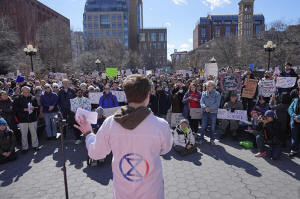Young scientists see career pathways vanish as schools adapt to federal
funding cuts
[March 17, 2025]
By CAROLYN THOMPSON, HEATHER HOLLINGSWORTH and MAKIYA SEMINERA
As an infant, Connor Phillips was born three months premature with
cerebral palsy. The science that saved his life was the inspiration that
led to his role studying brain processes as a research fellow at the
National Institutes of Health.
He had hopes of continuing his work at NIH through a partnership with
Brown University, where he was invited to interview for a program that
would lead to a doctorate in neuroscience. But training programs at the
NIH have been suspended, a casualty of funding cuts by the Trump
administration.
He is applying to other programs — and hoping policies putting strains
on science might be reversed.
“You don’t take these jobs that pay worse and have insane hours and are
really stressful unless you care about helping others and taking our
love for science and translating that into something that can improve
people’s lives,” Phillips said.
Reductions to federal support for research at universities and other
institutions under President Donald Trump are dimming young scientists’
prospects, cutting off pathways to career-building projects and graduate
programs.
Universities are cutting back offers of admission for graduate students
due to the uncertainty. Many also are freezing hiring as the Trump
administration threatens to take away federal money over their handling
of a wide range of issues from antisemitism complaints to diversity,
equity and inclusion initiatives.

Students are pivoting from carefully laid plans
Mira Polishook, a Duke University research technician, recently heard
from one of the programs she applied to that "government decisions” had
left it unable to offer her admission. She applied to the National
Science Foundation’s Graduate Research Fellowship which would guarantee
three years of graduate school funding, but lately NSF has been silent
on timing for awards. She's uncertain the agency will have funding at
all.
“It’s beyond frustrating,” she said. “It’s made me feel like I am in
limbo.”
Cuts to NIH funding have been delayed by a legal challenge from a group
of 22 states plus organizations representing universities, hospitals and
research institutions. But the uncertainty already has put some projects
on hold as universities deal also with delays or cuts in grants from
other agencies including USAID and NSF.
Admissions in some graduate programs have have been cut in half or
paused altogether, said Emilya Ventriglia, president of UAW 2750, the
union representing around 5,000 early career researchers at NIH
facilities in Bethesda, Maryland, and elsewhere.
“At this rate, with the hiring freeze, there may be no Ph.D. students
next year if it’s not lifted soon, because usually people make their
decisions by April,” Ventriglia said.
Ventriglia's research focuses on how the brain responds to
anti-depressants. But now she is unable to continue recruiting another
researcher she planned to mentor this spring. She said she also is
worried that new purchasing restrictions, and firings of employees who
processed those purchases, mean she will be unable to acquire reagents
she needs for experiments.
[to top of second column]
|

People listen to Griffin Gowdy, a PhD student at Columbia
University, speak during a "Stand Up for Science" rally in New York,
Friday, March 7, 2025. (AP Photo/Seth Wenig)
 “We’re expecting this to play out
for generations,” said Levin Kim, the president of a union that
represents 8,000 academic workers at the University of Washington.
The financial and emotional toll on those navigating the uncertainty
is mounting.
“I love the work that I do. It’s all I want to do,” said Natalie
Antenucci, a first-year graduate student at the University of North
Carolina. Her work at a lab researching the ways social experiences
can impact health is funded by an NIH grant. “I’m not in a financial
position where I could continue to do it if there wasn’t funding
available for this sort of work.”
Scholars see impact for the U.S. as a destination for researchers
Some American students are looking to institutions overseas.
Marleigh Hutchinson, who will graduate from Kansas State University
in May with an undergraduate degree in environmental engineering,
said getting hired in the U.S. as a graduate teaching assistant or
researcher seems unlikely because of the uncertainty.
“I’ve always told people I do want to work in the international
development space. I want to work on food security and water
security issues,” she said, “and if that’s something that the United
States is no longer going to value, then I would like to go
somewhere else.”
Hutchinson was notified last month that funding was slashed to a
USAID-funded lab where she was working. Its focus was making crops
more resistant to drought in places like Africa as the world grows
warmer.
At the University of Nebraska, an institute that works to improve
water management for agriculture offered to host a doctoral
candidate in hydrology from Ghana and was talking to three other
international students. But it had to rescind the offer after it
lost USAID funding, said Nicole Lefore, associate director of the
school's Daugherty Water for Food Global Institute.
She now worries about the diplomatic fallout, noting she has met
with agriculture ministers in other countries who were educated at
land grant universities in the U.S. through USAID programs.

“The university you go to, people have a loyalty to it. And so
bringing in generations of students for education and agriculture in
the U.S. helped to create those personal connections and then later
scientific and diplomatic connections. That’s really important to
the soft diplomacy side of what the innovation labs were doing.”
She said she is barraged with emails asking what this will mean.
“The only winner out of this is China, she said. ”Because the
countries that are being cut off there, I think they will turn to
someone.”
All contents © copyright 2025 Associated Press. All rights reserved |